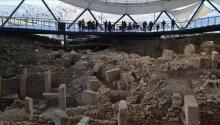Holocene
5,500-year-old Neolithic cranial amulets shed light on ancient belief system
And the Neolithic practice of using human remains for protection or luck is not unique to cranial amulets
Neolithic village discovered in France after 150 years of research
Archaeologists working a vast Neolithic site in northeast France have uncovered what they say is the last piece of the puzzle - traces of a permanent settlement.
The settlement was unearthed at the vast Neolithic site of Marais de Saint-Gond, giving rare insights into its social organization 150 years after the first flints were discovered.
Humans’ impact on the earth began a new epoch in the 1950s called the Anthropocene, scientists say
From climate change to species loss and pollution, humans have etched their impact on the Earth with such strength and permanence since the middle of the 20th century that a special team of scientists says a new geologic epoch began then.
Iraq’s ancient treasures sand-blasted by climate change
Iraqi archaeological marvels that have survived millennia and the ravages of war now face a modern threat: Being blasted and slowly buried by sandstorms linked to climate change.
Ancient Babylonian treasures, painstakingly unearthed, are slowly disappearing again under wind-blown sand in a land parched by rising heat and prolonged droughts.
The Dispilio Tablet: The oldest known written text
It was discovered by George Hourmouziadis in 1993 in a Neolithic lake settlement in Northern Greece near the city of Kastoria
- Read more about The Dispilio Tablet: The oldest known written text
- Log in to post comments
Migration from Siberia behind formation of Göbeklitepe: Expert
People who migrated from Siberia formed the Göbeklitepe, and those in Göbeklitepe migrated in five other ways to spread to the world, said experts about the 12,000-year-old Neolithic archaeological site in the southwestern province of Şanlıurfa.
Göbeklitepe may attract 5 mln foreign tourists: Minister
Göbeklitepe, thousands of years old Neolithic archaeological site in the southeastern province of Şanlıurfa, may lure as many as 5 million foreign tourists in the next five years, Culture and Tourism Minister Nuri Ersoy has said.
How the size of Europe’s Dogs changed in history
Some 8,000 years ago, Neolithic farmers from Anatolia and the Middle East brought dogs weighing about 33 pounds with them to central and southeastern Europe
- Read more about How the size of Europe’s Dogs changed in history
- Log in to post comments
British man gets 15 years over smuggling artifacts
A British citizen was sentenced on June 6 by an Iraqi court to 15 years in prison on charges of smuggling artifacts out of the country, in a case that has attracted international attention.
The verdict handed down to retired geologist Jim Fitton, shocked the court in Baghdad, including his defense attorney. He and his family have argued that Fitton, 66, had no criminal intent.
- Read more about British man gets 15 years over smuggling artifacts
- Log in to post comments
Excavations in Göbeklitepe may continue for decades: Expert
The excavation works in Göbeklitepe, a 12-000-year-old Neolithic archaeological site in the southeastern province of Şanlıurfa, may continue for decades, an expert has said.
"The site unearthed until today is not even 10 percent of all the complex that is still underground," Necmi Karul, a member of the Göbeklitepe Science Board, told Demirören News Agency.







